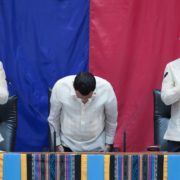Workers left behind in growing economy under Duterte administration
Wages of workers in the National Capital Region (NCR) continue to fall even as their growing labor productivity drives economic growth under the Duterte government, research group IBON said.
The mandated minimum wage is not even keeping up with the rising cost of living for ordinary Filipinos, the group revealed, adding that keeping wages low distributes wealth unevenly and worsens inequality.
The Philippine economy is slowing but real gross domestic product (GDP) still grew 6.7% in 2017 and 6.2% in 2018.
The regional GDP of NCR grew 6.2% and 4.8% in that same period, registering a total increase of 11.3% between 2016 and 2018.
In NCR, this economic growth was most of all driven by rising labor productivity. Labor productivity in NCR, measured by regional GDP divided by total employed, increased from Php568,092 per worker in 2016 to Php640,125 in 2018 or a total increase of 12.7% between 2016 and 2018.
These are IBON estimates using the latest available data from the Philippine Statistics Authority (PSA).
Yet despite rising labor productivity, the NCR real minimum wage is actually falling under the Duterte administration.
Measured at constant 2012 prices, this fell from Php467 in July 2016 to just Php457 in March 2019.
The Php46 worth of wage hikes since 2016 have been more than off-set by inflation and the continually rising costs of goods and services especially last year.
IBON also pointed out that the wage gap, or the difference between the minimum wage and the family living wage (FLW), is growing wider under the Duterte administration.
The NCR nominal minimum wage of Php491 in July 2016 was only 54.6% of the Php900 FLW for a family of five at the time.
Today, the NCR minimum wage of Php537 is just 53.5% of the Php1,004 FLW for a family of five.
The wage gap is even wider for a family of six where the NCR minimum wage is just 44.6% of the required Php1,205 FLW.
The research group said that real wages falling even further behind economic growth is worsening the elitist and exclusionary character of the economy.
Moreover, improving labor productivity is not translating to benefits for the working people but is instead going to bloating corporate profits and oligarch wealth.
The people are left to struggle with the rising costs of their food and non-food needs.
IBON stressed that the Duterte government is very much in a position to change this situation.
Among the most important measures is ensuring sufficient incomes for workers by legislating a national minimum wage of Php750.
IBON’s estimates using the latest available data, for 2016, show that a Php750 minimum wage in NCR will only cost 9.8% of the profits of establishments and still leave them with Php1.17 trillion in profits.
The increase in welfare for millions of workers and their families will however be palpable.#







